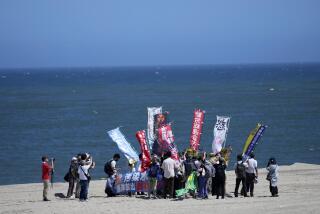Fears of radiation-contaminated food rise in Japan
- Share via
Fears about the safety of the Japanese food supply grew Sunday as authorities restricted some produce shipments and advised a town near a damaged nuclear plant not to drink tap water because of radioactive elements in its supply.
The Health Ministry said that radioactive iodine three times the normal level was detected in Iitate, a town of about 6,000 people 19 miles northwest of the Fukushima Daiichi nuclear plant, the Associated Press reported. That is one-twenty-sixth of the level of a chest X-ray and poses no danger to humans, a ministry official told the AP.
The warning came as authorities barred shipments of raw milk from the area and the sale of spinach from neighboring Ibaraki prefecture, news reports said. Officials have also found traces of radiation in the water supply in Tokyo and other parts of Japan, as well as in canola and chrysanthemum greens.
Photos: Unrelenting crisis grips Japan
Although officials underline that the levels of contamination are not immediately harmful to humans, the discoveries have caused new angst in a population already shaken by a massive earthquake and tsunami, quake aftershocks, power outages and the threat of a full-fledged nuclear meltdown.
Officials with the Vienna-based International Atomic Energy Agency confirmed Sunday that measurements at a location less than 30 miles from the stricken plant showed iodine 131 levels in milk up to 15 times above the level suitable for infants, Reuters reported. The radioactive element can accumulate in the thyroid and cause cancer. Another radioactive element, cesium 137, has also been identified in Japanese food products, Reuters said.
Photos: Unrelenting crisis grips Japan
Graham Andrew, a senior official with the IAEA, was quoted as saying that the contamination was “very localized” and that food produced in other countries had not been affected by the disaster.
More to Read
Sign up for Essential California
The most important California stories and recommendations in your inbox every morning.
You may occasionally receive promotional content from the Los Angeles Times.










